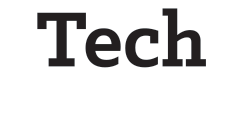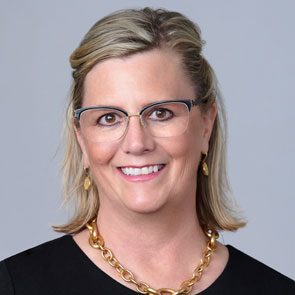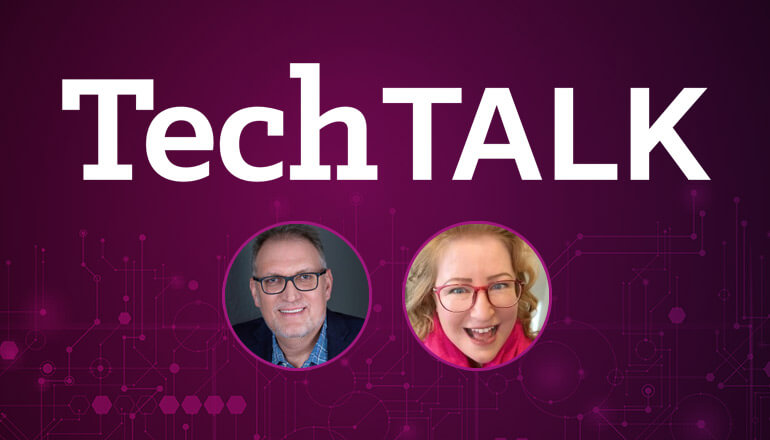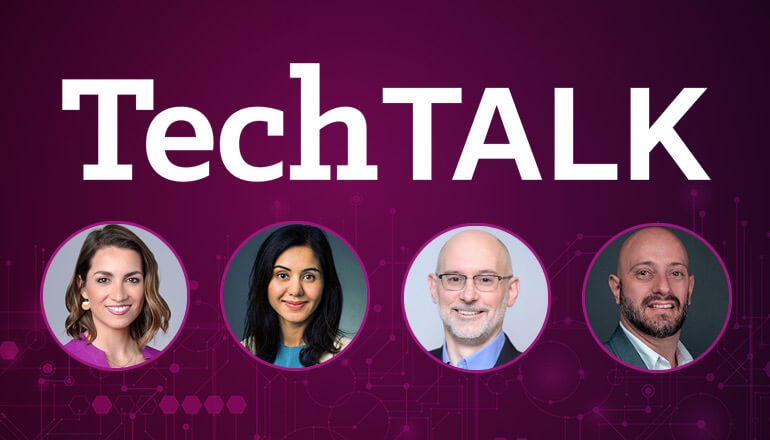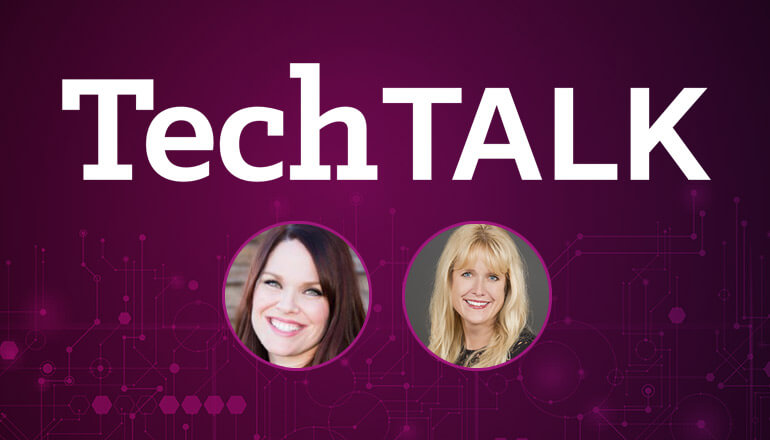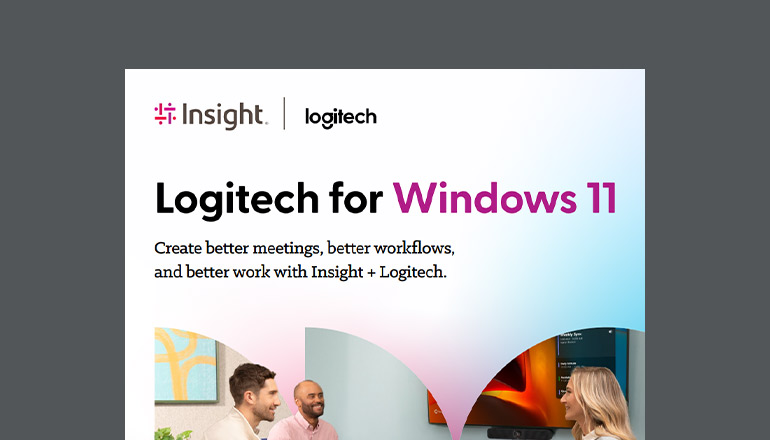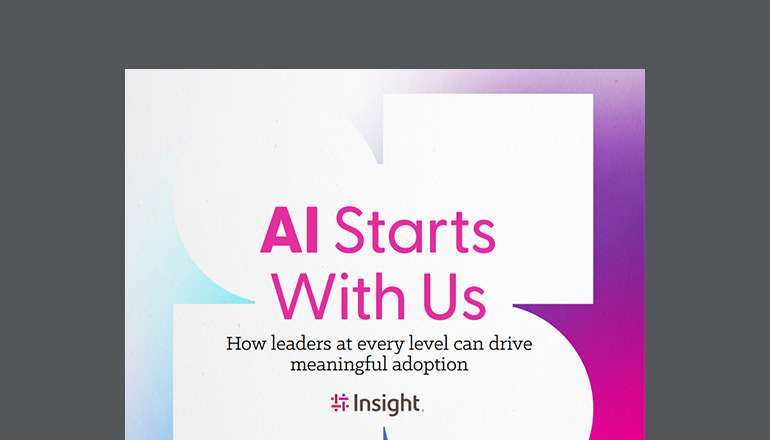Audio transcript:
Insight TechTalk – The Future of Work
Published June 18, 2020
[Music]
AMY
Hi Everyone, I'm Amy Protexter the Vice President of marketing at Insight and editor in chief of Insight Tech Journal.
We just released the summer issue of the Tech Journal focused on the future of business. But you really can't talk about the future of business without addressing the future of work. On that note, I'm so pleased today to be joined by Stephanie Hallford VP of Client Computing Group for Intel.
Welcome, Stephanie to TechTalk.
STEPHANIE
Thanks Amy, I'm excited to be here.
AMY
We're glad to have you because there's certainly a lot to talk about. You know, recently, I mean, it's like the biggest, it was the biggest story for quite a long time about this massive shift to remote work and ensuring business continuity, getting people back to work quickly, and changing how we have to collaborate and work with teammates and clients.
Given that everyone is in their homes, and in a very different setup than many of us are used to, how did Intel address this huge increased need for remote collaboration between employees?
STEPHANIE
Yeah, I mean, I can sort of give it in two areas. One is Intel as a corporation and a manufacturer, and then perhaps, you know, we'll share some of how, as a manager and an employee, you handle it, which is an entirely other interesting change that we're all living through.
On the Intel side, many of you may know Intel is a very large company, we have close to 110,000 people all over the world. And when this crisis really hit and as we all know, it hit at different parts of the world at different times. Intel…really job one was to make sure that we kept our fabs up and running. And this was particularly important because a lot of the medical support and services are powered by Intel technology in some shape or form, so the governments of various countries deemed Intel essential. And once you have a…you know, you're essential, you're able to keep moving.
That was key. And then round two, or job two, was okay, how do we keep all our employees productive? And then there's a fab type that there are some that absolutely have to be on-site, and I would say the majority of us do not, or certainly not every day, and so I think Intel IT got close to 100,000 workers productive by Monday morning--
AMY
Wow, that's incredible.
STEPHANIE
They doubled the VPN over the weekend. Over one weekend, they doubled Intel's VPN, so pretty amazing, you know, to see.
AMY
Yeah, so that's kind of been our reality now for the last few months. But you mentioned the fact that, many of us may not have to be in the office, certainly not every day. So what do you think the future holds for remote workers?
STEPHANIE
Yeah, I think it's going to be a hybrid of pre and post COVID or current COVID I would say. I think we've all come to realize working from home works. Generally it works. And we've figured out how to adapt and get the various peripherals and things that we need to be truly productive.
And I think that will evolve. I think apps and, you know, we will find which apps are most important to social users or to true business users or to doing our CEO, talking to the whole company at earnings time. You know, those all require different expertise and I think those will begin to become clear winners and losers.
But I do think that we will all have some level of hybrid where we're working from home quite a bit. And then, I think my own desire, and this may or not come true, would be that we would, kind of, designate days. You know, I would love to see us all know, Mondays and Fridays or Monday, Wednesday, Friday are virtual days. Tuesday, Thursdays are when it's best to do the on-site oriented activities.
Because, I think there is a human reality that if you're the only one on the camera, and everyone else is sitting in the conference room, you can't get you know, a word in edgewise. And you will end up having, you know, you'll feel left out. So those dynamics, I'm not sure how those will play out, but I do think that that is an important dynamic, you know, you're not as effective if you're the only one virtual.
AMY
Right yeah, I think you're so right. It is always hard to break in even on conference calls. You know, that's the kind of the running joke, oh, sorry, couldn't get off you, right? (Amy chuckles)
So sounds like you think remote work, or at least some portion of our work is here to stay. We're gonna be remote for a while, yeah.
STEPHANIE
Absolutely. And I think also Intel luckily…we had begun sort of…you know, we of course did not have this in mind when one we created vPro 14 years ago, which has remote manageability. IT can reach networks, even if they can't have a hands-on experience. Also, security…things of that nature incredibly important when we're working 24/7 from home, which is different than catching up on emails.
AMY
For sure, yeah. So, if (indistinct) challenge of being the only one not in the office but in this distributed workforce future, like, what other challenges does the tech industry specifically now face?
STEPHANIE
Yeah, from the tech industry perspective, I think there's a couple things. One is the level of support you need really differs according to your job. And so what I think, and this would not be only selective to tech companies. But, having a very strong telemetry capability, or you know what persona and what type of user you have all over the world, would allow you to (serve) those that are more mobile… and, maybe are traveling again or even moving around their neighborhood… versus somebody that really needs a high performance workstation for doing data crunching, et cetera.
And right now, a lot of companies have a hard time just with that telemetry data of really trying to understanding the needs of the users and then providing them the right device at the right time.
I think the second thing that we're constantly trying to do is evolve our ability to be proactive and predictive before something hits…make sure that we've got the insights that will allow us to either address it or shut down in most crisis situations…and be as predictive and proactive on that.
You know, our IT says that their number one goal is to be invisible over time… where you don't need to know they're there because everything is self-healing… and they're in the background making it work.
So that's our North Star, that's what we're trying to get to, but I think, first and foremost, connectivity, mobility, and having the performance to manage all the security agents that are coming at every step, those are probably the three biggies, we're really looking a lot at.
AMY
Yeah, well, that sounds really encouraging. I think technology has been able to help us solve a lot and certainly we're gonna need it to help us solve the next chapter of all this.
So, what job roles do you see changing or emerging from all this? Do you see sort of a different sort of workforce even?
STEPHANIE
Well, I do think it opens up a talent pool for different companies. When virtual work is accepted as norm, you know you could hire that person in Kansas City or in Guadalajara or wherever, in a much, I think, easier way. So, I think talent pools is an important change. And that means, most likely you'll have employees a bit more mobile between companies.
I think it will be, you know…we did one research where one fellow who works out of his dining room was saying, you know, “I just change my jobs like I change my suit. This is my office, this is my room, and this is my interface. And, I can just go from job to job because I have a deep expertise in XYZ area.”
So, I do think the mobility and the talent pool will change. I'm not sure individual roles will, but I think it will change a lot about how we source employees. And also, expectations on keeping employees productive and satisfied will be dependent on a company's ability to have remote environments.
AMY
Yeah, well, I'll tell you it's been really interesting talking to you today. Stephanie, is there anything else you wanna leave our listeners and viewers with before we close today?
STEPHANIE
Well, you know, I think we're all in this together. I do think the biggest change that we are likely going to see out of all of this is a cultural one. And hopefully, it's a positive cultural change where, because we've seen each other's dogs and kids running by in the background, we maybe know each other in a different way than just that office setting…and that's usually a positive thing.
I think we all have a little more empathy for work life balance…and the ability to, you know, because you're not spending an hour or two in a car or train, you can go get a workout really quick. And I do think that it's creating a more humanizing aspect, amidst all of the chaos.
And so, I sort of hope that, we all come away with…a more compassionate and flexible workforce and colleague-cohort.
AMY
Yeah, wow I think that sounds fantastic, and I'm gonna hope that right along with you. So thank you today for joining us Stephanie, and thank you all for joining us for the TechTalk.
To gain even more insight about the future of business and consequently the future of work, check out our latest issue of the Tech Journal at insight.com/techjournal.
And again, thank you, Stephanie, so glad to have you on the TechTalk today.
STEPHANIE
Oh, thanks Amy, thank you for inviting me.
AMY
You bet.
[Music]
